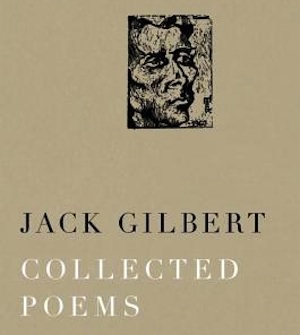A Beast Bent on Grace
In Jack Gilbert's poetry, the mythic anguish of Orpheus in the underworld suddenly seems fused with something very much like the room in which you sit.
“Collected Poems” A book by Jack Gilbert
Jack Gilbert’s debut was a phenomenon. When he first appeared on the literary scene — winning the prestigious Yale Younger Poets prize in 1962 for “Views of Jeopardy” — he was accorded a measure of celebrity that even today’s media-savvy luminaries would envy. (How many other poets find their photos featured in Esquire, Vogue and Glamour?) He was hailed for his unique voice and sensibility and, rising from the gritty landscape of industrial Pittsburgh, for taking a bold stance counter to the prevailing fashions.
And what did the young writer do after such a promising start? He packed his bags and vanished, spending years traveling across Europe, Greece and Japan, stopping to teach for a time when his money ran low. In a word: He lived, which it’s clear was his goal all along. Poetry was his tool for carving a path into raw experience and the depths of the self. Compromise (of the sort an academic career would require) did not suit his temperament. That his choices seemed to place not only his comfort but his emotional well-being at stake added heft to his subject matter and gravity to his voice. Gilbert could veer between the operatic and demotic to produce thrilling and unsettling effects. “How astonishing it is,” he wrote in “The Forgotten Dialect of the Heart,” “that language can almost mean, / and frightening that it does not quite.”
A full 20 years went by before his second collection was unveiled, and this too was a resounding success. “Monolithos” was the only title that year among the finalists for all three of the major prizes: the American Book Award, the National Book Critics Circle Award and the Pulitzer Prize. Look at the rave reviews on that book’s dust jacket and you’ll find an array of literary lions who have probably agreed on nothing else in their careers. As he wrote in an earlier poem, his aim was to possess “the earth by language,” a grand ambition for any poet.
|
To see long excerpts from “Collected Poems” at Google Books, click here. |
Like many in Gilbert’s generation, he was influenced by Ezra Pound’s emphasis on the image and, through Pound and Arthur Waley’s translations, the nuanced particularity favored by China’s Tang dynasty masters. To these approaches, Gilbert wedded an unflinching honesty, a diction that steered clear of rhetorical flourishes and a love for what he termed “true nouns” — the sort of concrete and elemental experience he could use to unearth the oldest themes in our cultural storehouse and make them breathe again in our atmosphere.
Where else but in Gilbert can a detailed description of cooking breakfast evolve into an interrogation of the divinity (“Going Wrong”)? Who else can fashion a lacerating little gem like “Married,” which begins: “I came back from the funeral and crawled / around the apartment, crying hard, / searching for my wife’s hair.” And when he believes he’s lost the last trace of her: “A year later, / repotting Michiko’s avocado, I find / a long black hair tangled in the dirt.” The mythic anguish of Orpheus in the underworld suddenly seems fused with something very much like the room in which you sit.
Essentially, Gilbert has spent his life as a recluse, in the time-honored Chinese tradition, whether living on the tiny Greek isle of Paros or in the midst of crowded cities. As he writes in “Spring”: “A taste for solitude. The knowledge / that love preserves freedom in always / failing. An exile by nature. Where, / indeed, would I ever be a citizen?”
Now, with Gilbert well into his 80s, the release of his “Collected Poems” gives us a chance to view the arching span of what he’s created. At the heart, the power of a poet’s work becomes a matter of penetration: How deeply does it insinuate itself into the core of our experience? Too often, I find myself reading verse in contemporary journals filled with bright surfaces and beautiful complexity, poems that, two minutes after the page is turned, I’ll never think of again. By contrast, we continually return to the work of Jack Gilbert because he gets under our skin. Simply put, my own solitude would feel more desolate if it had not been fortified by an engagement with his.
Steven Ratiner’s interview collection, “Giving Their Word: Conversations With Contemporary Poets,” has been reissued in a new paperback edition.
© 2012, Washington Post Book World Service/Washington Post Writers Group
Your support matters…Independent journalism is under threat and overshadowed by heavily funded mainstream media.
You can help level the playing field. Become a member.
Your tax-deductible contribution keeps us digging beneath the headlines to give you thought-provoking, investigative reporting and analysis that unearths what's really happening- without compromise.
Give today to support our courageous, independent journalists.







You need to be a supporter to comment.
There are currently no responses to this article.
Be the first to respond.